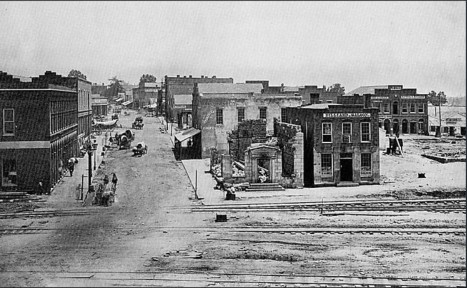Previous Post: Battle for Atlanta
Little Doctor on the Black Horse
The Fall of Atlanta
by Harriott Benedict Wickham Barton
.
Just two days later the Rebels fled from Atlanta, and the victorious Union Army swept into that great Southern stronghold. History has told us of the ensuing panic, flight and destruction. One of the most vicious aspects of war is its effect upon the minds of people, both in and out of the armed forces, warping the thinking of ordinarily friendly and tolerant folk. One remembers the indiscriminate anger against Germans and Japanese in the recent war. It is hard, now, to recapture that “war psychology,” but we all felt it to some extent. It was, perhaps, deeper, during the War Between the States, because of a deep sense of betrayal on both sides. Some of this anger, hardness and war weariness creeps into David’s letters from here on, though he curiously mixed it with pity for the individual people he meets. It is hard to hate human beings who are suffering!

Destruction in Atlanta – 1864
“Atlanta, Sept. 7/64 – My dear wife, Your letter of Aug. 21 was received today. We have had no mail for some time, since we started on the last raid. I suppose you have seen by the papers that Atlanta is taken. Our forces entered on the morning of the 2nd. Next day I went over to Jonesboro, a place of about 1500, built, like most Southern towns, along both sides of the railroad, but not back into the country. Many fine houses but nearly all deserted. There were nearly 1000 prisoners there. They are collecting them there, to send north. Also our sick and wounded. I don’t know what the poor people of this country will do for a living this winter. Our big army has stripped them of nearly everything. There must be much suffering. We issue them rations now, but when we are gone, what will become of them? However, they take the food from us and then abuse us, the women mostly. It is stated that when we moved back from in front of Atlanta last week they had a great jollification, as they thought we were retreating. Lots of ladies came from Macon to attend, and many went out and slept in the trenches we had evacuated! But the joke was, the first they knew, we had the railroad in their rear and they had much trouble getting back home . . . Don’t be upset when the children ask about death! I don’t mind seeing a dead man any more. I have lain beside them all night.”
“I saw some very pretty ladies today, but don’t know how intelligent they are. One had black curls, and a soldier for every curl. The other had on a fine green silk dress. I suppose she wanted to captivate some of the Yanks. As she crossed the muddy street in front of me, she obeyed the first military order: “Dress up before. Close up behind.” I saw she had on very dirty underclothes, which spoiled the charm some. This afternoon I went over to town and saw the Rebel’s wounded. They were in an awfully dirty condition. Their doctors are awful lazy. There was lots of cotton in a building nearby. I would have taken it and made them beds, made them comfortable anyhow.”
GO TO NEXT POST – Army Life After the Fall of Atlanta –
 About the Author: Harriott Benedict Wickham Barton (1890-1981) was born in Norwalk, Ohio to Frank and Agnes Wickham. Her father was the youngest of twelve children of Frederick and Lucy Wickham, early settlers of the Firelands, and her mother was the great-great granddaughter of Platt and Sarah Benedict, who founded the city of Norwalk. Educated at Norwalk High School and Wooster College, she became a teacher. She marched as a suffragette and worked for the Labor Department during World War I. After the war, she went west to teach school, and became one of the last homesteaders, proving up a property near Wheatland, Wyoming. She married Angus Barton in 1924 and they raised four children on the homestead through the Dust Bowl and World War II. In the late 1940s, she and her Angus moved to Ohio, where they spent the rest of their lives. During the 1950s and ‘60s, she wrote “Little Doctor on the Black Horse,” poetry, and short stories, some which were published in various journals and magazines.
About the Author: Harriott Benedict Wickham Barton (1890-1981) was born in Norwalk, Ohio to Frank and Agnes Wickham. Her father was the youngest of twelve children of Frederick and Lucy Wickham, early settlers of the Firelands, and her mother was the great-great granddaughter of Platt and Sarah Benedict, who founded the city of Norwalk. Educated at Norwalk High School and Wooster College, she became a teacher. She marched as a suffragette and worked for the Labor Department during World War I. After the war, she went west to teach school, and became one of the last homesteaders, proving up a property near Wheatland, Wyoming. She married Angus Barton in 1924 and they raised four children on the homestead through the Dust Bowl and World War II. In the late 1940s, she and her Angus moved to Ohio, where they spent the rest of their lives. During the 1950s and ‘60s, she wrote “Little Doctor on the Black Horse,” poetry, and short stories, some which were published in various journals and magazines.
Thanks for visiting! Share and like this post below, and on Facebook. Let me know what you think in the comments. I’d love to hear from you!
© 1961 by Harriott Benedict Wickham Barton. All rights reserved.
Filed under: Civil War | Tagged: Battle for Atlanta, Civil War, David DeForest Benedict |


Leave a comment